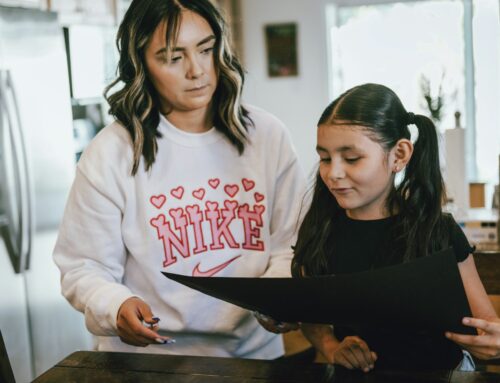For the last 20 years, I have worked in some capacity with adolescents, particularly troubled teens. When I worked in foster care, I witnessed firsthand the impact of parental choices on children, some good and some not so good. When I worked in law enforcement, I saw how a lack of parenting created long-term problems for both the adolescent and parents. When I transitioned into school counseling, I witnessed how a lack of support in a child’s early years often resulted in a lack of support in a child’s high school years.
But the main thing I have learned in working with troubled teens is how not having a sense of belonging creates space for depression. What does a lack of belonging mean? Belonging means connection. Belonging means knowing that you are accepted as you are. It means security.
 Can you imagine a life without security, without belonging anywhere? Think about high school for a minute. We have cliques: the athletic students, the drama/band students, the robotics/engineering students and we have the outliers. The outliers are those students who don’t fit in anywhere. This was the group I specialized in at my high school. These were the students who sat in my office in tears because they felt rejected, angry because they felt different, or isolated because they felt no one cared about them.
Can you imagine a life without security, without belonging anywhere? Think about high school for a minute. We have cliques: the athletic students, the drama/band students, the robotics/engineering students and we have the outliers. The outliers are those students who don’t fit in anywhere. This was the group I specialized in at my high school. These were the students who sat in my office in tears because they felt rejected, angry because they felt different, or isolated because they felt no one cared about them.
Brene Brown’s latest work, Braving the Wilderness (2017) talks about this. She mentions how deeply she disagreed with a quote by Maya Angelou.
The quote was:
“You are only free when you realize you belong no place – you belong every place – no place at all. The price is high. The reward is great.”
Brown talks deeply about how strongly she felt this was wrong. People have to belong someplace. Belonging is powerful. It’s necessary. Brown talked about how she felt alone all of her adolescent years and that included not belonging to her family. How powerful and concerning is that? To be an adolescent and feel as if you belong no place, including within your own family?
So I created space in my office for adolescents to try to find a sense of belonging. I allowed them to come into my office, close the door, and just be themselves. They cried, voiced their anger, admitted to their depression, and more often than not, learned to love themselves. I’m not a miracle worker, but I am patient. And adolescents need our patience to help them break through that “attitude,” that tough exterior wall they put up and don’t know why they did.
 Depression in adolescents doesn’t always look the same in adults. Sometimes parents see an angry or moody teenager. Adolescents are changing: physically, psychologically and socially. Sometimes unrealistic expectations are placed on them: excel academically, socially, athletically. But what if they are socially awkward and this expectation of excelling is not in their wheelhouse?
Depression in adolescents doesn’t always look the same in adults. Sometimes parents see an angry or moody teenager. Adolescents are changing: physically, psychologically and socially. Sometimes unrealistic expectations are placed on them: excel academically, socially, athletically. But what if they are socially awkward and this expectation of excelling is not in their wheelhouse?
According to Mental Health in America, these are some of the symptoms of depressed adolescents:
- Poor performance in school
- Withdrawal from friends and activities
- Sadness and hopelessness
- Lack of enthusiasm, energy, or motivation
- Anger and rage
- Overreaction to criticism
- Feelings of being unable to satisfy ideals
- Poor self-esteem or guilt
- Indecision, lack of concentration, or forgetfulness
- Restlessness and agitation
- Changes in eating or sleeping patterns
- Substance abuse
- Problems with authority
- Suicidal thoughts or actions
These are feelings that most adolescents are not sure how to cope with, so they might take unnecessary risks, have friends that lead them down the wrong path, become hostile and aggressive. Often, they have no idea how to put words to their feelings or how to label them, so they will need the help of a professional. They will need someone to walk on that path with them and help them come out on the other side of the fog.
I’m a storyteller, so let me tell you a story to bring this point home. At my school in Florida, I worked on self-esteem with a young lady her entire freshman year of high school. When I first met her, she came into my office and announced that she wanted her mother to come pick her up, withdraw her from school, and homeschool her. She said she was being bullied.
Turns out she heard another student telling a story about a television show (“13 Reasons Why”), internalized that conversation, allowed it to ruminate all day and night, and came to the conclusion it was about her and now she was being bullied.
All school year we worked on reframing conversations, teasing out her fears and insecurities, creating a space for her to practice mindful meditation before school started each morning, setting the tone for her day and her weekends. I created calming glitter bottles, purchased tons of playdough for her to self-soothe when she felt overwhelmed, we tracked her good days and bad days in a journal she kept in my office, and we talked. Honest, deep, conversations that touched the heart of her depression.
 As she trusted me, she disclosed more of herself. As she trusted me, the idea of running away from her pain decreased. As she trusted me, barriers came down and her self-esteem increased. But she also saw her own success – in her grades, in her social skills, and in her art.
As she trusted me, she disclosed more of herself. As she trusted me, the idea of running away from her pain decreased. As she trusted me, barriers came down and her self-esteem increased. But she also saw her own success – in her grades, in her social skills, and in her art.
She started selling her artwork at the local farmer’s market and weekend art shows. She stepped out of her shell and took safe risks, which was an incredible feat for her. We read books together that addressed some of the issues she was having. Our favorite author was Brene Brown and her work on shame and vulnerability.
At the end of the school year, she put up a flyer advertising the “Misfits Belong Here Group.” At first, the school administrators and I were very concerned about starting and naming this group. But before the last day of school she had a strong group of 15 students who worked together over the summer to create a welcoming space for incoming freshmen who felt like they didn’t belong anywhere. No one was rejected, all were welcomed.
She started her sophomore year a leader, strong in her belief that she belonged someplace. She still had bouts of depression, but now she could manage them, and talk more easily and with honesty about depression. She no longer wore depression as a heavy coat, but in her terms “it’s a light sweater.”
What this student did was reframe her depression into a space where she was in control and not the depression. Where she had the power over depression and not her depression over her. But let’s be very clear – this is not how it works for everyone. And this is not how I thought it would work for her.
 Depression is hard, it’s uncomfortable, and it can be a long, painful road for the person suffering with it. But I firmly believe that God has a plan for your life (Jeremiah 29:11-14). I think it was God’s plan to bring this student into my office at that time. Not because I was the best school counselor ever, but because I was the school counselor she needed at that moment. I was the one for her in her time of need, at that moment in time. I was reminded while working with her of 1 Corinthians 13:4 – “Love is patient, love is kind ….”
Depression is hard, it’s uncomfortable, and it can be a long, painful road for the person suffering with it. But I firmly believe that God has a plan for your life (Jeremiah 29:11-14). I think it was God’s plan to bring this student into my office at that time. Not because I was the best school counselor ever, but because I was the school counselor she needed at that moment. I was the one for her in her time of need, at that moment in time. I was reminded while working with her of 1 Corinthians 13:4 – “Love is patient, love is kind ….”
How does one bring a Christian perspective to working with adolescents? Carefully. One of the things I do is to carefully explore the adolescent’s faith and allow them to learn to develop their own voice when it comes to their faith.
Surprisingly, adolescents have a lot of questions about God. Answering their questions often helps the therapist (at times) grow stronger in their own faith. They walk on a path, sometimes creating the path to walk on, that leads them to a place of healing. As a Christian counselor, it’s important to me to give them space to find their voice, their faith, and their strength. To find out about the plan that God has for their life. As Brene Brown teaches us, to find their place of belonging.
For more information on the work of Brene Brown, please take a look at her website: http://brenebrown.com/
Below is a list of her books. I have read all of these and recommend them for working with adults and adolescents. I have placed them in order of publication, starting with the most recently published work.
Brown, B. (2017). Braving the Wilderness. New York: Random House.
Brown, B. (2015). Rising Strong. New York: Random House.
Brown, B. (2012). Daring Greatly. New York: Penguin Random House.
Brown, B. (2010). Gifts of Imperfection. Minnesota: Hazeldon Publishing.
Brown, B. (2007). I Thought it was Just Me. New York: Gotham Books.
“Concert Time,” courtesy of Joshua Davis, unsplash.com, CC0 License; “Alone,” courtesy of Fineas Anton, unsplash.com, CC0 License; “Pondering,” courtesy of Felix Russell Saw, unsplash.com, CC0 License; “Growth,” courtesy of Alex Blajan, unsplash.com, CC0 License





